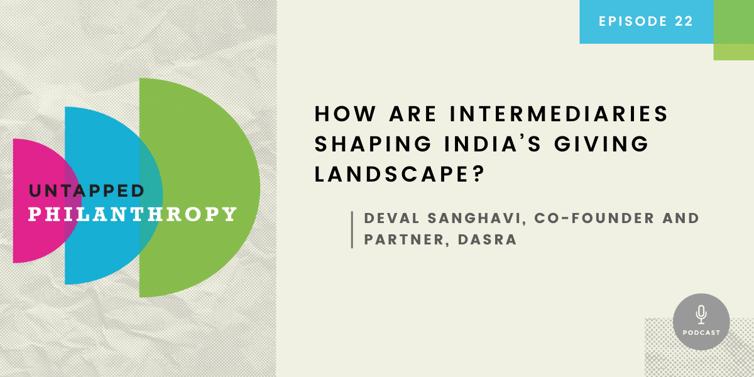
It’s impossible to discuss the giving landscape in India today without acknowledging the drastic economic reforms that made it possible. In 1991, India adopted a new industrial policy to liberalize the economy, increase employment opportunities, boost production and productivity, and encourage foreign investments. The policy substantially deregulated the industrial sector. Today, India’s economy is one of the fastest growing in the world. And the profitability of the last 30 years has led to immense new wealth creation. Now, much of that new wealth is looking to give back, and India has seen a sharp rise in new philanthropists and donors. One organization looking to support these donors (and communities across the country) is Dasra.
Dasra is an intermediary and strategic philanthropy foundation in India's multi-stakeholder development ecosystem. Its goal is to help India achieve its sustainable development goals by 2023 by helping funders give more strategically to vulnerable communities. When the pandemic struck India, the team led by this week’s podcast guest and Dasra co-founder and Partner, Deval Sanghavi, sprang into action and employed swift and effective trust-based philanthropy practices to support communities throughout India.
Untapped Philanthropy Season 2, Episode 10: How are intermediaries shaping India’s giving landscape?
“When COVID hit, we saw millions of families walking home because the transportation was cut, and migrant and informal workers were left to fend for themselves. We realized that there was a need to double down on community-based organizations, especially those that were working with marginalized communities that don't have access to strong government programs because of how remote they are,” said Deval.
Soon Dasra — an organization that was already partnered with over 700 organizations across India — was rapidly expanding its network to tap into little-known community organizations in far-flung reaches of India. Dasra shared their funding criteria with their community of partners and stakeholders and asked them to give recommendations for community-led organizations that met those standards.
“We automatically provided them grant funding because we knew if they were recommended, the thought process and diligence would be far greater than any 50-page or 100-page results framework. And we trust them to support their communities,” said Deval.
But a trust-based grants practice doesn’t just involve relaxing the application process. The grants themselves need to also demonstrate an understanding that community organizations know how to support their communities best and what’s needed to do it. “At a procedural level, all of the funds we give are five-year commitments of unrestricted funding to each organization, so they can do whatever they want with it. The funds are there to enable these organizations to have that comfort and safety net and be more resilient and start rebuilding their communities,” said Deval.
To learn more about Dasra’s story and the impact their community is having on Indian society, start listening to the episode linked above.
A note for our community
The core concepts of trust-based philanthropy have been debated, discussed, and researched for years. But if season two of Untapped Philanthropy has revealed anything, it’s that the pandemic drastically accelerated trust-based philanthropy practices worldwide. Again and again, our guests have shared how they chose to decisively act when our health and safety were at stake. And nearly all of the guests that have shared tactical examples of how they employ trust-based philanthropy each day have doubled down — telling the podcast that they plan to continue giving in this manner long after the pandemic subsides.
As technologists, we couldn’t be more motivated to meet givers where they are and support grantmaking processes based on empowering the grantee. We’re all a part of this giving reset.
You can catch up on last month’s episode of Untapped Philanthropy — Does the fear of failure keep us from learning? — featuring a conversation between Fluxx co-founder, Kerrin Mitchell, and Founder and Director of the Turner Kirk Trust, Ewan Kirk, right from our blog or on your favorite podcast listening apps, including Apple, Spotify, and Google.
Episodes of Untapped Philanthropy are released monthly and always shared on the Fluxx blog. We encourage you to subscribe to the Fluxx blog to stay up to date on new episode releases and follow us on social media for podcast excerpts and more!
Download the transcript here.